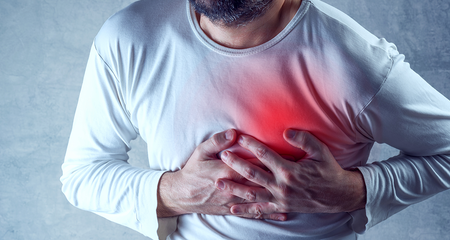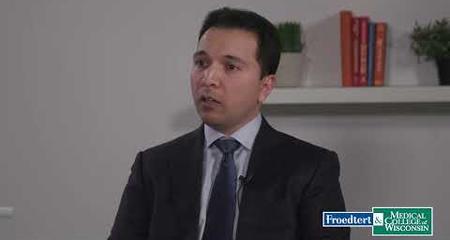Cardiomyopathy is any disease of the heart muscle in which the heart loses its ability to pump blood effectively. The condition affects about 50,000 American adults and children. There may be multiple causes of cardiomyopathy and it may be associated with diseases involving other organs, as well as the heart.
Cardiomyopathy conditions tend to be progressive and sometimes worsen fairly quickly. Dilated cardiomyopathy is a leading cause for a heart transplant. Patients with cardiomyopathy are more likely to develop ventricular arrhythmias, which increases their risk of cardiac arrest. Certain diagnostic tests can be performed to help predict the patient's risk of cardiac arrest and guide physicians in recommending proper treatment.
What Causes Cardiomyopathy?
Viral infections that affect the heart are a major cause of cardiomyopathy. In some instances, cardiomyopathy is a result of another disease or its treatment, such as complex congenital heart disease (present at birth), nutritional deficiencies, irregular heart rhythms (arrhythmia) or certain types of chemotherapy for cancer. Sometimes, cardiomyopathy can be linked to a genetic abnormality. Other times, the cause is unknown.
Types of Cardiomyopathy
Hypertrophic Cardiomyopathy (HCM)
Hypertrophic cardiomyopathy occurs when the muscle mass of the left ventricle of the heart is thicker than normal, or the wall between the two ventricles (septum) becomes enlarged and obstructs the blood flow from the left ventricle. Because it prevents the heart from properly relaxing between beats, it fills with less blood, which limits the amount of blood pumped by the heart with each beat. A heart murmur may be heard, which is related to the obstruction below the aortic valve (valve between the left ventricle and the aorta).
Hypertrophic cardiomyopathy is a rare disease and in most cases it is inherited. It can affect men and women of all ages, and symptoms can appear in childhood or adulthood. Symptoms include shortness of breath on exertion, dizziness, fainting and angina pectoris. Some patients experience cardiac arrhythmias, which may lead to sudden death. Learn more about specialized Froedtert & the Medical College of Wisconsin's highly specialized hypertrophic cardiomyopathy program.
Dilated Cardiomyopathy
Dilated cardiomyopathy is the most frequent form of nonischemic cardiomyopathy (those not related to coronary artery disease). The cavity of the heart is enlarged and stretched (cardiac dilation) causing the heart to become weak and not pump normally. The condition occurs most often in middle-aged people and more often in men than women, but has been diagnosed in children. Most patients develop congestive heart failure.
Dilated cardiomyopathy can be caused by alcohol abuse and dietary deficiencies. It occasionally occurs as a complication of pregnancy and childbirth. Other suggested causes are: various infections (which lead to an inflammation of the heart muscle, called myocarditis), toxins, heredity and medication side effects.
Restrictive Cardiomyopathy
Restrictive cardiomyopathy, the least common type of cardiomyopathy in the US, occurs when the myocardium of the ventricles becomes excessively rigid, and the filling of the ventricles with blood between heart beats is impaired. The condition usually results from another disease, which occurs elsewhere in the body. Symptoms may include fatigue, swelling of the extremities, and difficulty breathing on exertion.
Genetic Testing for Inherited Cardiomyopathy
Cardiac MRI and other tests can be conducted by cardiac geneticists to determine if a patient has an inherited cardiomyopathy condition. Testing can confirm a diagnosis in someone showing signs of the condition. It can also identify family members at risk of developing the condition later in life so they can be screened regularly and treated as soon as heart changes begin to appear. These conditions are often associated with an electrical problem in the heart, or arrhythmia (irregular heartbeats).
In addition to hypertrophic cardiomyopathy (HCM), other genetic cardiomyopathies include:
- Long Q-T syndrome, a hereditary disorder of the heart’s electrical rhythm that involves repeated fainting and a high risk of cardiac arrest.
- Arrhythmogenic right ventricular dysplasia (ARVD), a genetic, progressive heart condition in which the heart’s right ventricle muscle is replaced by fat and fibrosis, causing irregular heart rhythms.
- Brugada Syndrome, an inherited, potentially life-threatening heart rhythm disorder diagnosed when a specific abnormal heartbeat is detected by an electrocardiogram.
Treatments for cardiomyopathy often include medications, implantable defibrillators or bi-ventricular devices.
The Society for Vascular Surgery's Vascular Quality Initiative (SVS VQI) has awarded Froedtert Hospital three out of three stars for its active participation in the Registry Participation Program. The mission of the SVS VQI is to improve patient safety and the quality of vascular care delivery by providing web-based collection, aggregation and analysis of clinical data submitted in registry format for all patients undergoing specific vascular treatments. The VQI operates 14 vascular registries.
Blogs, Patient Stories, Videos and Classes





